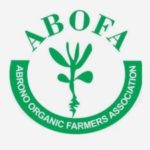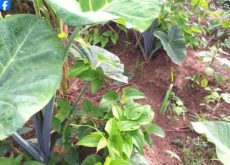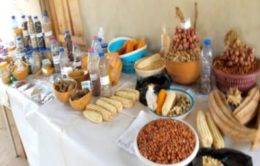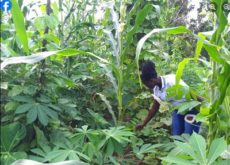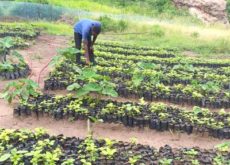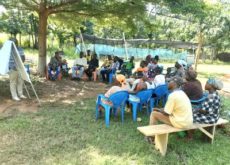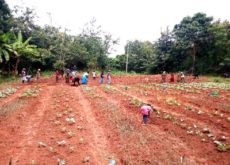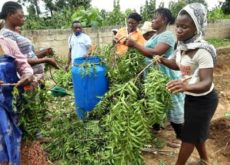This article is essentially extracted from an IIED (International Institute for Environment and Development) article for which you will find the link at the bottom of the page
ABOFA started as a project in 1992. At that time, one community was involved in a project called Forikrom Promoting Afforestation. But during the project, other partners came on board to support the development of community action plans that ultimately targeted six communities. The membership established an association.
The (NGO) Concern Universal came in to support members to install drip irrigation systems for dry-season vegetable production. Thus, several other agricultural communities have joined the association to benefit from it.
The current number of members is around 6,000 farmers (half are women and a quarter young). And today ABOFA has a 30-year track record of working in Central Ghana
Organization
Each farmer cultivates small plots of about 1 hectare, growing as many as 30 different crops in those small areas, alongside a wide range of medicinal herbs and different types of livestock.
The day-to-day affairs of the association are managed by an advisory council and leaders of farmers’ groups assisted by a secretariat
Nana Kwaw Adams is the Founder and the Executive Director at ABOFAP NGO
ABOFA’s vision
Its vision is to ensure ‘favourable enabling environments, improved livelihoods and food security for rural farm families and communities’
Location
ABOFA operates around the town of Forikrom and Techiman City in the Bono East Region of the transitional zone of Ghana. It has members in the regions of Ahafo, Ashanti, Bono, Bono East, and Savanna Region.
The ABOFA offices are located between Techiman/Forikrom off the Nkoranza Road, a five-minute drive from Techiman.
The total land size managed by the combined total of ABOFA members is over 5,000 hectares. The members’ lands are situated in what was once tropical moist rainforest with relatively infertile clay soils
What they do ?
The main content of the trainings is focused on agroecological farming systems
Agrobiodiversity training
The training includes a range of modules: soil testing, land preparation, organic vegetable farming, compost preparation, rainwater harvesting, nursery practices (including for fruit and agroforestry trees), beekeeping, grafting and recordkeeping.
Farmer seed harvesting, seed multiplication and seed bank
Training of farmers in various methods of preserving food seeds. ABOFA estimates that 90% of those in the transitional ecological zone have been trained.
ABOFA in partnership with CIKOD is supporting farmers in Forikrom and the surrounding communities to construct a community seed bank for the express purpose of managing and preserving Indigenous seeds. The community seed bank is managed by ABOFA and is maintained through member contributions
The community seed bank is open to all of the 6,000 farmers, ABOFA currently works with, and is also accessible to other interested farmers. The long-term plan is for ABOFA to become a hub for storing and preserving Indigenous seeds and plant food species from across Ghana, which other organisations can also learn from.
Beekeeping
With support from other NGOs, ABOFA has helped 60 farmers acquire 200 beehives to provide them with an alternative livelihood.
Agrobiodiversity
ABOFA has trained farmers who plant cash crops such as mango and cashew to increase their planting spacing so as to intercrop their cash crops with other species such as maize, onions, cowpeas and yams.
ABOFA has shown farmers how to maintain intensive pruning of cashew and mangos when these crops become overgrown : within the plantation cows, pigs and poultry are left to feed and graze. This practice helps to fertilise the soil and enriches agrobiodiversity.
Organization of the organic products market
ABOFA has also developed new virtual markets for organic food production to sell food directly to local consumers, as a result of the COVID-19 pandemic
Exchanges, information and promotion of agrobiodiversity
ABOFA is continuing to promote and help sustain agrobiodiversity with its members, for example during regular round table meetings, and by producing flyers, banners and infographics. ABOFA’s objective is to expand its operations and promotion of agroforestry to other districts for wider coverage.
The IIED article which this article is essentially extracted from
– Advancing agrobiodiversity through agroecology, seed management and enterprise development in Ghana : Producer organisation : Abrono Organic Farmers Association (ABOFA)
See also a CIKOD publication where ABOFA activities are presented :
– Agroecology in Techiman, Bono East Region of Ghana
CONTACTS and LINKS
As we don’t have any direct contact to give from ABOFA, we give those from CIKOD who could put you in contact with them.
Bern Guri, founder and executive director and the Africa Food Sovereignty Alliance coordinator.
– Mail : guribern@gmail.com
Wilberforce Laate, deputy executive director (southern ghana)
– Mail : wilraby@yahoo.com
CIKOD (Center for Indigenous Knowledge and Organizational Development)
– Office address : PRQF+FHV, Oyarifa White House, off Accra-Aburi Road Opposite K OFORI Ltd Accra-Oyarifa, Pantang West, Ghana
– Tel : +233 (0) 302 518 045 // (0) 501 322 900
– Mail : dbanuoku@cikodgh.com
– Facebook : https://www.facebook.com/p/CIKOD-100064818545748/
– Site : https://cikodgh.com/
See also other agroecological actors in West Africa
In Ghana and also in Niger, Ivory Coast, Togo, Mali, Burkina Faso, Benin and Senegal
The Google Maps
On the map, choose an icon (then “more info” on mobile). You will find notices with contacts (when we found them), links, photos and sometimes videos.
Mil’Ecole – Mars 2024
